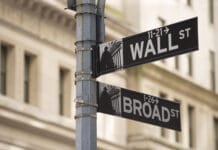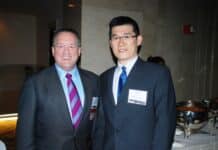FLASH FRIDAY is a weekly content series looking at the past, present and future of capital markets trading and technology. FLASH FRIDAY is sponsored by Instinet, a Nomura company.
Paul Jiganti recently bade farewell to the securities industry after a 40-year career.
Earlier this week, Traders Magazine caught up with the well-known trading and market structure veteran to hear about his past, present and future.

How did you first get into the business?
Out of college I interviewed for entry-level jobs at banks and the Fed, but I didn’t land anything. A friend of my older brother’s was on the trading floor at the Cboe — he knew I had been a runner on the Board of Trade for two summers, and he let me clerk for him. Once I got on the floor that first day as a clerk, in 1985, I knew it was for me. It was the constant competition and action all day.
It checked a lot of boxes. It was a job and I was 22 years old and needed one of those, but it was more than that. I saw that you had to work hard, but if you did the right things, you’d be rewarded financially in a totally merit-based way. That appealed to me.
So the real start of my career was with Rob Maine, who was wonderful to me and taught me the ethics of trading as well as trading itself. I traded for him for a year then he encouraged me to go out on my own. He was an incredibly generous guy. Trading went well until the early 1990s, when it got extremely slow. I was married with two small children and not making enough money. Fortunately I stood in a pit next to Jerry Steinborn, a partner at Susquehanna and a friend, and with the encouragement from my wife asked him if they needed any traders. He took me on and post Jerry’s retirement I ended up heading the office the last few years I was there, until late 2009. A great ride.
Briefly walk us through your career path after that, with Nasdaq, TD Ameritrade, and IMC?
Every place was important for me to learn and meet interesting people along the way.
Eric Noll and I worked together at Susquehanna for years and we’re still close friends. He was at Nasdaq and asked if I would do a consulting job for them which I was happy to do, as it allowed me to meet retail firms and learn about an area that I knew little about. Unfortunately the new product that we introduced at Nasdaq wasn’t very successful, but it was good to meet a lot of people.
As that was winding down, JJ Kinahan and Steve Quirk, who were in leadership positions at TD Ameritrade’s Thinkorswim office in Chicago, suggested I apply for the recently vacated market structure and retail routing job. It was a uniquely entrepreneurial retail firm and as it turns out another great way to meet a new set of people in the industry.
While there Andrew Larson and Scott Knudsen at IMC were looking to get into wholesaling of equity options and approached me to help them start the project. Another very lucky find for me.
It was an amazing group of incredibly smart people at IMC – it reminded me of a young Susquehanna, but with more technology, being 20 years later. I remember they sat me down between two women who were in their mid- to late twenties, and I remember talking to them while thinking, “These are the smartest people I’ve been around in a long time.” They didn’t know the old business as well as some other people but I think that was part of their secret sauce. They weren’t stuck in outdated trading ideas, rather they were just looking for technological solutions. The reason I bring this up is the woman to my right is now IMC’s US CEO, and the one to my left is running trading.
Why did you stop trading and go down the other path?
I was a pretty good floor trader, but over time I recognized I wasn’t going to be a great screen trader. So at Susquehanna, I made the mental switch to put more energy into helping run the office and be on committees, and starting in the late nineties, I was on every committee I could find at the Cboe.
I understood my skill set. As a floor trader I was quick to react to requests for quotes, with the biggest wallet, Susquehanna’s money, and loud, but that doesn’t necessarily translate to the screen.
Looking back over your career, what would you cite as your biggest accomplishment? And when was the most challenging/difficult time?
The most difficult time was deciding to make the transition from an independent market maker to a big firm. Business and opportunity really dropped off in 1990 and 1991 – it zapped my finances. I wasn’t looking forward to another year of zero income. It was tough and gave me a lot to think about. Now at age 61, it’s hard to look back and believe I could sleep with all that uncertainty. But somehow it worked out.
The biggest accomplishment was setting up the wholesaling business at IMC with DASH Financial. Dave Dooman and I ran around the country explaining how this combination will work and work well. It created even more competition in a very competitive space where it is #2 by volume across the retail equity options.
When did you know it was time to step away?
A couple of things gave me a nudge. One, I had circled this date for several years and once I mentally started down a path like that, it would have been tough to turn around. The second is, I wanted to leave with as much energy as I started. Before the pandemic I was on over 100 flights a year. Once we had hired an incredible backup, Shawn Cruz, I knew IMC would be just fine and arguably better without me. He is a better technologist than I am, has more energy, vision, and a lot of creative ideas. I know he’s the right guy to take the business to the next level. Shawn’s hiring and a series of back-to-back trips, led to a conversation where I mentioned to my wife that I was tired and getting sick of the grind, and for the first time ever she said, “So am I.” That was it, I knew the time was right. Everyone would be better off.
What’s your day-to-day like now?
There are a few things. I’m consulting a bit with IMC, and I’m still on the board at MIAX. I also have a relationship with a software firm that touches our business and is starting to ramp up. So I’m still involved, but at a level that’s appropriate for the time that I want to spend. And my day-to-day is, to spend time at our house in the desert near Palm Springs, where I’ll be playing golf and hiking or biking every day. I’m trying to get back in shape after years of travel.
I have three daughters, hopefully I’ll have grandchildren at some point. I have three siblings who live within half a mile of me, in California and in Chicago area we are fortunate enough to have my wife’s three siblings and parents close by. Lots of family and I think that’s what it’s all about.
Any final thoughts?
I’ve had a great send-off from IMC, friends, and former colleagues which I really appreciate. Overall I’m just an incredibly fortunate person.








